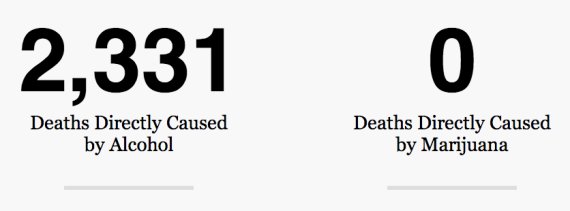A new website launched this month is comparing the direct death tolls from marijuana and alcohol use.
If you click over to Since This Morning, you'll see a number growing on the left, above "Deaths Directly Caused by Alcohol," while the number on the right, above "Deaths Directly Caused by Marijuana," remains at zero. These are estimates of the total people directly killed by each drug since the beginning of the day.

(Here's what Since This Morning looked like as of 11:30 a.m. EST this morning.)
The alcohol-related deaths figure is based off global statistics for annual alcohol-attributable deaths from a World Health Organization report, using the latest available data. To get the number on the left, accidental alcohol-attributable deaths -- such as those from traffic accidents -- are subtracted from the total number deaths due to alcohol. Counting only deaths due to the direct effects of alcohol consumption and dependence, around 1,760,000 people are killed by those causes around the world each year. This number is then used to calculate total deaths per second, and that figure is paired with the current time to estimate the total number killed so far that day.
While the alcohol counter is something of a rough estimate, the marijuana data is more precise. Nobody has ever been killed directly by marijuana use. According to one study, a marijuana smoker would have to consume thousands of joints' worth of THC -- the compound that gets users high -- in order to be at risk of dying.
The direct lethality of THC may not be up for debate, but drug warriors frequently claim that marijuana leads to deaths because it is addictive and leads to violence, suicidal thoughts and interest in harder drugs. The studies they use to back these contentions are controversial, however, and many don't actually draw the conclusion that smoking pot in and of itself leads to these behaviors.
Cannabis has also been ranked as less addictive than most other drugs, including legal ones like caffeine. Even the allegations that smoking pot leads to long-term and potentially fatal health problems like cancer are in dispute, though a number of studies have suggested that cannabis use could be linked to higher rates of testicular cancer.
Now, none if this means that there aren't consequences for irresponsible marijuana use. As with almost any substance, over-consumption of THC can cause adverse effects. Health professionals have recently raised concerns about the improper use of edible, cannabis-based products, especially by children. Eating too much of them may not be lethal, but dizziness, sweating, nausea, vomiting and extreme paranoia are not uncommon symptoms of over-consumption. High driving is also understandably a concern, though states and federal authorities have taken steps to keep people off the road after using marijuana.
Despite the stark differences in health risks between marijuana and alcohol use, federal drug agencies have continually denied that pot is less toxic than alcohol. And while anti-marijuana efforts continue to fuel the failed global war on drugs, getting drunk is celebrated as a national pastime in many places around the world.
Out of a total of 1.5 million drug arrests made in the U.S. in 2011, about 750,000 were for marijuana -- a Schedule I drug under federal law, next to heroin and LSD. That averages out to a pot arrest every 42 seconds, according to an FBI report. A clear racial disparity is apparent in the enforcement of these laws, as black Americans are nearly four times more likely than white Americans to be arrested for marijuana possession, even though they use the drug at about the same rate. These trends have made harsh anti-weed laws a key contributor to the nation's prison-industrial complex.
The Since This Morning website launched just weeks after Attorney General Eric Holder announced that the federal government wouldn't intervene as Colorado and Washington state implement voter-approved plans for a system of legalized marijuana for adults. The symbolic step back gave the green light to other state legalization efforts, likely bolstered by national and state polling that has shown increasing support for legal pot. Holder's move also outraged police groups apparently not excited to see a shift away from the failed war on drugs.
While the Department of Justice explained its reasons for backing away from its previous commitment to marijuana prohibition at a Senate hearing this week, a number of federal prosecutors have said they don't believe the new policy announcement will change much about the types of pot prosecutions they bring.

